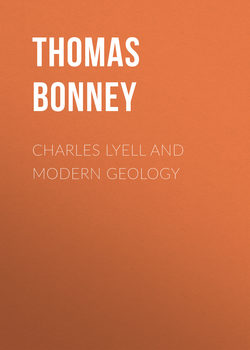Charles Lyell and Modern Geology

Реклама. ООО «ЛитРес», ИНН: 7719571260.
Оглавление
Bonney Thomas George. Charles Lyell and Modern Geology
PREFACE
CHAPTER I. CHILDHOOD AND SCHOOLDAYS
CHAPTER II. UNDERGRADUATE DAYS
CHAPTER III. THE GROWTH OF A PURPOSE
CHAPTER IV. THE PURPOSE DEVELOPED AND ACCOMPLISHED
CHAPTER V. THE HISTORY AND PLACE IN SCIENCE OF THE "PRINCIPLES OF GEOLOGY."
CHAPTER VI. EIGHT YEARS OF QUIET PROGRESS
CHAPTER VII. GEOLOGICAL WORK IN NORTH AMERICA
CHAPTER VIII. ANOTHER EPOCH OF WORK AND TRAVEL
CHAPTER IX. STEADY PROGRESS
CHAPTER X. THE ANTIQUITY OF MAN
CHAPTER XI. THE EVENING OF LIFE
CHAPTER XII. SUMMARY
Отрывок из книги
Caledonia, stern and wild, may be called "meet nurse" of geologists as well as of poets. Among the most remarkable of the former is Charles Lyell, who was born in Forfarshire on November 14th, 1797, at Kinnordy, the family mansion. His father, who also bore the name of Charles,1 was both a lover of natural history and a man of high culture. He took an interest at one time in entomology, but abandoned this for botany, devoting himself more especially to the study of the cryptogams. Of these he discovered several new species, besides some other plants previously unknown in the British flora, and he contributed the article on Lichens to Smith's "English Botany." More than one species was named after him, as well as a genus of mosses, Lyellia, which is chiefly found in the Himalayas. Later in his life, science, on the whole, was supplanted by literature, and he became engrossed in the study of the works of Dante, of some of whose poems2 he published translations and notes. Thus the geologist and author is an instance of "hereditary genius."
Charles was the eldest of a family of ten – three sons and seven daughters, all of whom grew up. Their mother was English, the daughter of Thomas Smith, of Maker Hall in Yorkshire, "a woman of strong sense and tender anxiety for her children's welfare." "The front of heaven," as Lyell has written in a fragment of autobiography, was not "full of fiery shapes at his nativity," but the season was so exceptionally warm that his mother's bedroom-window was kept open all the night – an appropriate birth-omen for the geologist, who had a firmer faith than some of his successors in the value of work in the open air. He has put on record only two characteristics of his infancy, and as these can hardly be personal recollections, we may assume them to have been sufficiently marked to impress others. One if not both was wholly physical. He was very late in cutting his teeth, not a single one having appeared in the first twelvemonth, and the hardness of his infant gums caused an old wife to prognosticate that he would be edentulous. Also, his lungs were so vigorous and so habitually exercised that he was pronounced "the loudest and most indefatigable squaller of all the brats of Angus."
.....
The school, like all other collections of boys, had its epidemic hobbies. The game of draughts, coupled unfortunately with gambling on a small scale, was followed by chess, and that by music. To each of these Charles was more or less a victim, and his progress up the school was not thereby accelerated. Birds'-nesting also had a turn in its season. His love for natural history made him so keen in this pursuit that he became an expert climber of trees. But his schooldays on the whole were uneventful, and he went to Oxford at a rather early age, his brother Tom having already left Midhurst in order to enter the Navy.
One important result of this journey was a conjoint paper on the excavation of valleys in Auvergne, which was written before the friends parted, and was read at the Geological Society in the later part of the year. Lyell writes thus to one of his sisters from Rome, on his return thither, in the following January22: —
.....